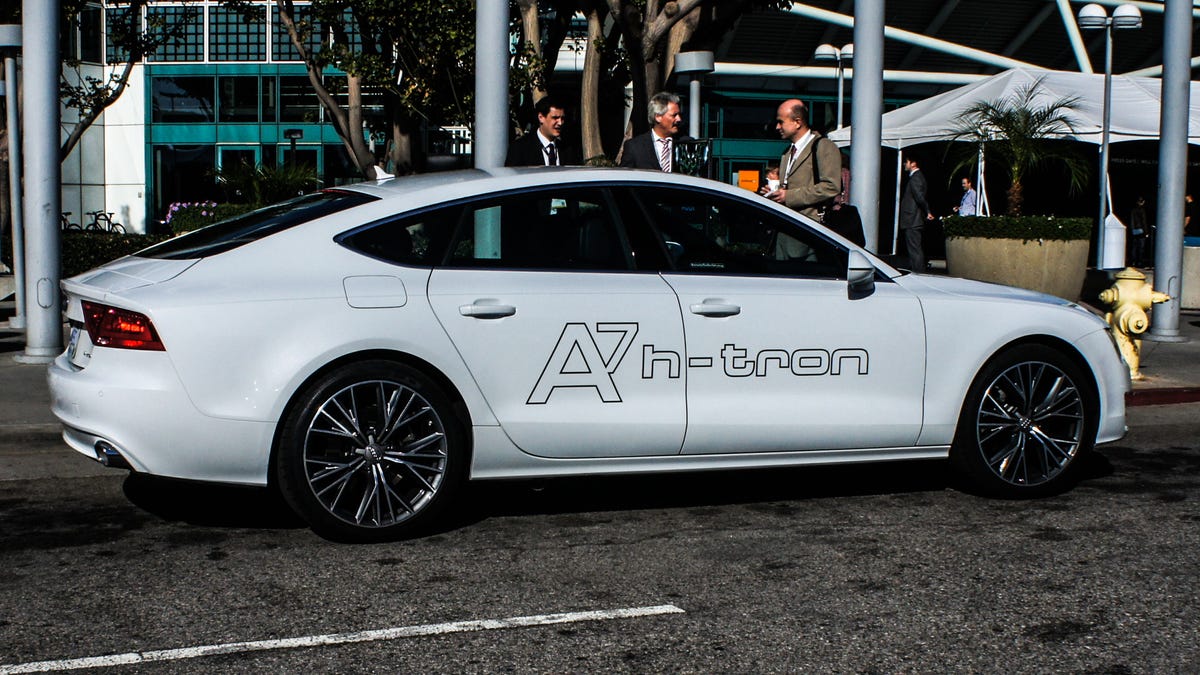Audi A7 h-tron combines best of fuel cell and battery pack tech
Audi showed off a new development vehicle at the Los Angeles Auto Show, a fuel cell-battery hybrid car called the A7 h-tron.

LOS ANGELES -- Most battery and fuel cell cars tend to be compact models converted to run on electricity. At the Los Angeles Auto Show, I was sitting at the wheel of something much bigger, an Audi A7 model with motors at the front and rear wheels.
This was the Audi A7 h-tron, a new development vehicle that's letting Audi explore the possibility of a long-range, zero-emission vehicle. I couldn't help but think the car was designed to compete with the Tesla Model S .
Packaged in the car, I was told by Oscar De Silva Martins, Audi's head of communications, were four hydrogen tanks storing about 5 kilograms of hydrogen. Audi notes that, with the car's fuel cell generating electricity, it can go 100 kilometers (62 miles) on 1 kilogram (2.2 pounds) of hydrogen.
I've driven hydrogen fuel cars before, most recently the 2016 Toyota Mirai , also on display here. But Audi gave the A7 h-tron a unique twist, an 8.8 kilowatt-hour lithium-ion battery pack that can be charged from the grid as well as capturing electricity from regenerative braking. Martins told me that the A7 h-tron lets the driver choose whether to run off the battery pack or hydrogen tanks, or let the car manage the usage.
With full hydrogen tanks and a charged battery pack, the A7 h-tron has a range of over 340 miles. As with other fuel-cell vehicles, the only emission is a small amount of water.
Inside the cabin were typical A7 model cabin appointments, such as a dial on the console for controlling content on the dashboard-mounted LCD. However, instead of a tachometer the car showed a power gauge, and the fuel level indicated how much hydrogen was left in the tank.
Putting it in drive and pressing the accelerator, the A7 h-tron glided forward as smoothly as any electric vehicle. During my short drive in downtown LA, the front and rear wheel motors worked in symphony, neither seeming to dominate the drive equation. Where I have felt a sort of pull in front-wheel driven electric cars, the A7 h-tron felt more neutral between front and rear.
Lacking was much in the way of fast acceleration from a stop. Audi puts its zero to 62 mph figure at 7.9 seconds, which is much more leisurely than I've come to expect from the company's production cars. However, stabbing the accelerator while underway lead to that instant torque feeling you get from electric cars.
This drive experience was good, if sedate, showing that Audi may be on the right track in developing this sort of hybrid hydrogen-battery drivetrain. The car could be very practical, if it weren't for the dismal lack of hydrogen fueling stations currently available in the world.
Check out our complete coverage of the LA Auto Show

